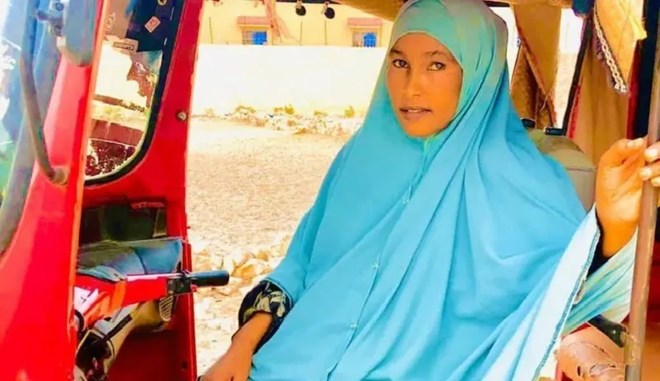
Sunday September 15, 2024

Hawo Jookar sits confidently in her Bajaj. (Credit: Supplied by Hawo Jookar)
Mogadishu (HOL) — Hawo Mahamud Farah, known as Hawo Jookar, has broken barriers in the Somali town of Adado'by becoming the first woman to drive a Bajaj (auto-rickshaw) for a living. Despite facing societal backlash and danger on the roads, she took up the job to support her five children, challenging deep-seated gender norms in the process.
Hawo's journey to becoming a Bajaj driver began after she was left to care for her five children with no support. "I got married young," she recounted, "but was later left with five children to care for, with no one to support us." Faced with this daunting reality, Hawo sought employment to provide for her family.
With a background in education, she volunteered at a local hospital, hoping it would lead to a permanent job. However, she was passed over when the opportunity arose to become a full-time employee. "It was a harsh blow," she said, recalling the moment that pushed her to explore other options for survival.
When her efforts to find traditional employment failed, Hawo explored all conventional options before an unconventional idea took root: she would become a Bajaj driver—a job almost exclusively held by men in Somalia. She approached a Bajaj rental service, but the owner hesitated to rent to a woman, only agreeing after Hawo promised to secure a guarantor from her family. "He was stunned by my request," she recalled. Yet, her family initially refused to support her, influenced by rumours that she only wanted to drive the vehicle for social media fame. "My uncle, who I hoped would vouch for me, turned me away," she said. "He told me to look for another job in town."
After overcoming the initial resistance from her family, Hawo received the Bajaj and ventured onto the streets of Adado, aware of the stares and whispers but confident in her path. Her presence behind the wheel sparked mixed reactions: surprise, criticism, and admiration. While some residents mocked her for defying gender roles, others encouraged her bravery. "Many people were surprised, but there were also those who encouraged and supported me," she said.
Driving a Bajaj brought Hawo financial relief but was not without danger. As a woman in a male-dominated occupation, she encountered threats from thieves and individuals who resented her challenge to traditional norms. Hawo recalled a harrowing incident when three men asked her to take them outside town. Suspicious of their intentions, she kept a close watch on them through the rearview mirror. "They stopped me in the middle of nowhere," she recounted. "Two of them got out and stood on either side of me, while the third remained in the Bajaj, asking for my phone number to transfer the fare."
Realizing she was in danger, Hawo jumped off the Bajaj. Fortunately, she was carrying a concealed pistol that a cousin had given her for self-defence. She fired a warning shot into the air, shouting for them to back off. "It was the only way I escaped their trap," she said.
After working as a Bajaj driver for over a year and a half, Hawo saved enough money to buy her own vehicle, thanks in part to the support she eventually received from her family. However, the job took a toll on her health, as the constant jostling on Adado's rough roads led to kidney pain. She then sold the Bajaj and used the proceeds, along with additional funds, to buy a small car for taxi services. Later, she sold the car to purchase a plot of land and a small drill used for digging stone pits.
"Women can do any job that men can do," she said, "I urge women to get up and work," she said.